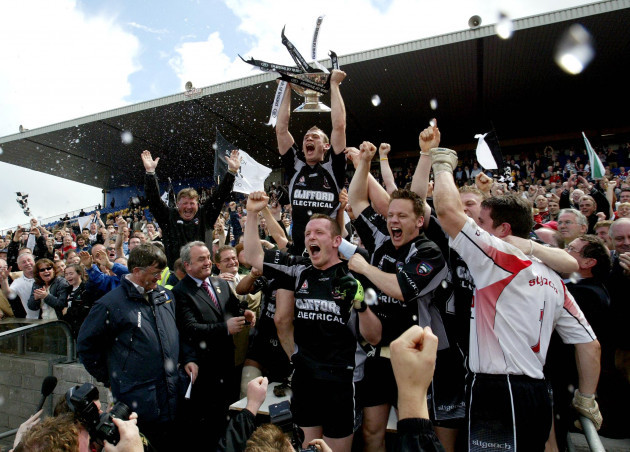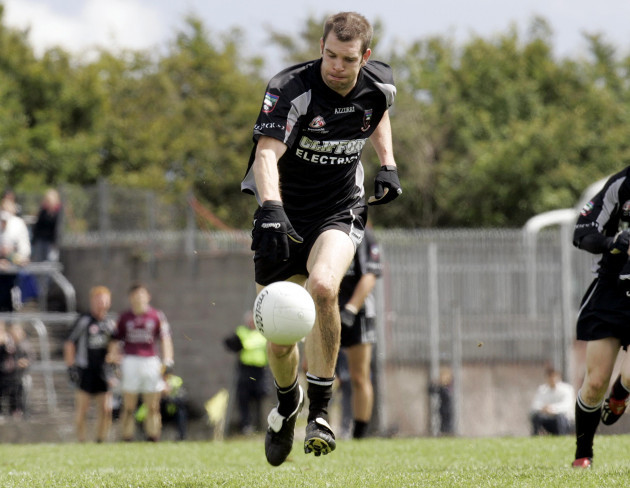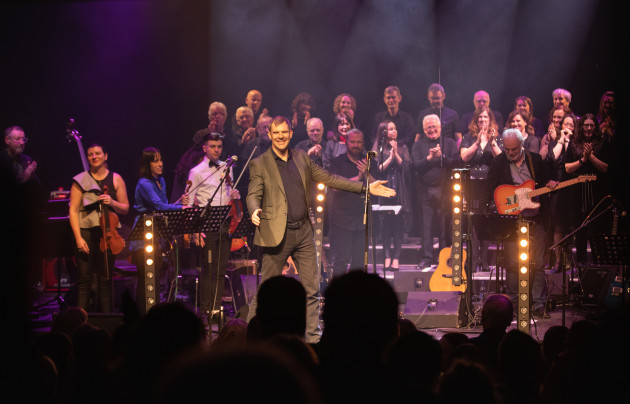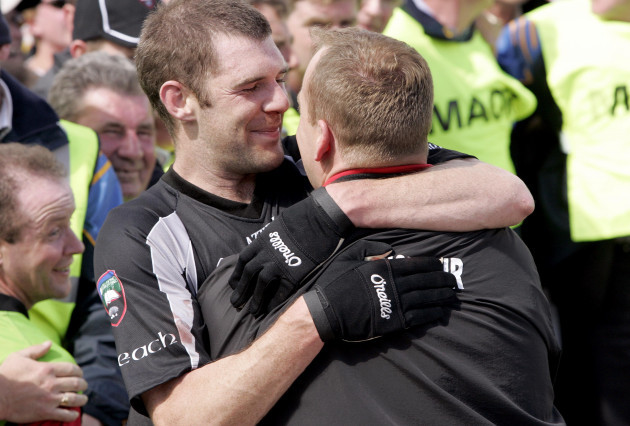TWO MEN ARE sitting at a bar in the town of Easkey on the Monday after the Sligo’s unlikely success in the 2007 Connacht football final.
One of the men is a midfielder from the team who has just ended a 32-year wait for senior provincial glory. He also kicked the first point of that final against a Galway side who were favourites to win.
The other man is a local bachelor who is entering his winter years. He’s talking about the women in his life who have come and gone and his reasons for sidestepping marriage all these years. In the midst of him tallying the events of his well-worn life, he leans in and lowers his tone to a whisper.
“That was a great thing ye did,” he says. It’s not hugely profound, but it’s enough to reaffirm the magnitude of Sligo’s achievement. Ending famines in sport have far reaching effects, some of which the players will never see. And sometimes, they get a glimpse into what the triumph means to those around them.
Kieran Quinn, who partnered the great Eamonn O’Hara in that final, always considered the significance of the number 32 before the final. From 1975 to then was a long time for Sligo’s people to have to wait for a Connacht crown. It was just their third Connacht title in all. But there is only so much of the historical weight that the players can appreciate before they’re in danger of being overwhelmed by the occasion. It takes conversations like this, in the aftermath of victory, to help them understand what they have done.
“There was such gravitas attached to it,” Quinn says, remembering that chat in Easkey 16 years ago. “You could just tell he had lived through such heartbreak over the years.
“Now it’s already 16 since we have done it, and that’s mad. 32 years was an eternity. The chances don’t come around often.”
****
Kieran Quinn picked up football late in his youth. He kicked a bit of ball as a youngster in primary school but subsequently lost touch with his club Coolera-Strandhill.
He spent his teenage years as a boarder at the famous Clongowes Wood College in Kildare where his father once attended. Known more for its association with rugby, Quinn didn’t have many chances to develop his Gaelic football skills during his time there. Former Ireland and Leinster star Gordon D’Arcy was in Quinn’s year but the Sligo man never developed a taste for the Gilbert ball.
After school, he ventured to Australia for a year. And that’s when he felt the embers of an old love rekindling within him.
“I was working in a school and there was a painter there who was Irish and he brought me to the club the Irish Australians.
“There was a guy from Clare who had this yellow ute which was one of these trucks with an open back and we’d hop in there with the dogs and head out the other side of Sydney to go training. That was magic and that’s where I started rediscovering my love for football. And then I got home and got involved with the club again. Immediately, I felt, ‘This is it.’ Home. Reconnecting with lads, reconnecting with community and in fairness, everyone was so welcoming.
“I can bring it back to one moment: I remember hitting a ball with the outside of my boot into the corner-forward to a fella called Shane O’Neill. Shane was a bit older than me and I hit the ball straight into his chest. He turned and stuck it over the bar, and he ran out to me, grabbed my two cheeks and just said, ‘Quinner, that was unbelievable.’ Just to get that reinforcement from someone a bit older and someone who you looked up to, it was just a moment I’ll always remember.
“That was summer ’99 and by summer ’00, I had my debut for the Sligo seniors so it was mad how it all snowballed after that.”
The 2007 Connacht final was the pinnacle for Sligo in that era, and it was certainly a shock. The Galway team they defeated was bristling with All-Ireland winners from the 1998 and 2001 teams. Ja Fallon, Derek Savage and the current Galway manager Pádraic Joyce were still mainstays on that team. A young Michael Meehan was a menacing forward at the time too. Galway were also being managed by former Sligo manager Peter Forde. He knew all the tricks of the team that he had helped to build.
But this Sligo team was coming and they had racked up some striking results in the preceding years. In 2001, they beat Kildare in the first year of the football qualifiers. The following year, they beat Tyrone one year before their All-Ireland breakthrough and eventually lost out to Armagh after a replay in the All-Ireland quarter-final. Armagh would eventually end that season as All-Ireland champions.
Sligo’s path to the 2007 Connacht final began with a successful trip to New York, followed by a semi-final win over Roscommon.
“I remember New York being fancied. There was always stories of lads who played county football and they were over there playing great stuff. I remember the management having me teed up for this midfielder with dyed blonde hair, telling me I couldn’t let him get the better of me in midfield.
“That was a great trip. We stayed a few days afterwards and had a bit of craic, and did a bit of extra training. It was our equivalent of going to Portugal or Spain for a training camp. I remember a sing song in the hotel lobby one night, and it definitely brought us closer.
“All of a sudden, you’re in a final and the whole thing changes. You’ve a shot at glory. We had been in a final in ’02 also against Galway on the day of the World Cup final in Castlebar. Galway were off the back of an All-Ireland that year, and we really thought we could beat them. We were close enough but they were just better than us on the day.”
****
Football wasn’t the only passion in Quinn’s life. From about the age of 16, he had been teaching himself to play piano by ear. He originally began tapping the ivory keys when he was a child, but the conventional methods of teaching didn’t inspire him. He ended up quitting the scales, the exams and the classical tunes at around 12.
Four years later, in school one day, he heard the first few bars of a familiar song. It was U2′s With Or Without You. But it wasn’t Bono’s vocals, or the Edge’s guitar licks that drew him in. It was the baseline that played on a loop in Quinn’s head. And when he got home, he returned to the piano for the first time in a while and worked out the piano version of the song.
“That is the moment I always remember as something was getting me and something I can work with. It wasn’t a hard baseline, it was four notes, but to envisage what the notes were in my head, and then put it on a piano with the sound as I hoped it would. It was the discovery that you could transfer notes from your ear to the piano, which I never knew before. And it was a song I liked and I could play music I want to play. It doesn’t have to be the classical stuff that turned me off piano in the first place.
“I hadn’t played the piano for four years at that stage. Thankfully, Mam and Dad respected my wishes to give it up. A lot of parents would tell you to keep at it and get the grades. They said it was fine but to keep up the music in some way. I remember playing the cello for a few years. And then I found my way back slowly.”
Through his self-taught methods, Quinn also learned how to play The Cranberries anthem Zombie, and with the help of some school mates, he learned how to perform Bohemian Rhapsody by Queen. He wanted to showcase their arrangement of the rock classic at a school concert and relied on the help of a supportive music teacher to have their version included in the running order.
“I had a great music teacher called Liz Keighary.
“I remember her having my back when it came to getting these things included in the programme. Even though it wasn’t her thing and she didn’t necessarily know much about this style of music, she was very encouraging and willing to learn along with me. That was the first teacher that helped me, and following that, I took a break for a few years.”
****
By the 2007 season, Quinn was back on the music beat again and was now a full-time musician. Pubs, weddings, bands – there was always a stage for him to play on. He had started teaching piano too, finding a way to blend his own way of interpreting music through ear, along with the more traditional techniques.
His work in entertainment was difficult to balance with his football commitments, but the then Sligo manager Tommy Breheny supported Quinn’s choices.
“Tommy’s influence was massive,” says Quinn, still grateful for his manager’s accommodating nature all these years later.
“I was challenging at times for a manager, I’d say because I was starting my career as a musician at the time. We had a league match in Wexford that spring and I had a gig in Clonakilty on the Saturday night. In fairness, Tommy told me to play the gig and I remember finishing the gig at midnight or 1 o’clock and you’re driving across the south coast of the country to get to Wexford, and you’re not in the hotel until 4am.
“And then you’re up for the breakfast and it’s totally not ideal preparation. But there was never any, ‘Can you do without this gig, Kieran?’ I think he understood me and he worked around me. I have no doubt that he got the best out of me.
“You wouldn’t get that leeway from a lot of managers.”
His teammates quickly became fans too, although there was also playful banter mixed in with the support.
“Hey Oscar Peterson, sing us a song, would ya?’” they would sometimes say to get a rise out of their midfielder.
In a sport where such a profession is a rare sight, Quinn’s friends were just doing what they could to make sense of it in their own language. Are ya still at the music? How’s the music going? Trying to understand but not fully sure of what he does for a living.
“There was definitely a bit of slagging but it was all good natured. I never got an inkling that it was causing any friction or bother. They came to my gigs and came to support me. Any time there was a piano in a hotel lobby, we’d sit down and have a sing song? It was a positive thing overall.”
Quinn is still very much at the music. He released five albums throughout his career, is still a piano teacher, and also conducts theme-based community musical shows. He also collaborated with the sports podcast Second Captains to help produce a beautiful piece that paid tribute to the Republic of Ireland women’s team qualifying for the World Cup last year.
Here's @kieranquinnn performing one of our favourite SC audio beds at our recent Gang's All Here shows. It's our tribute to @amberbarrett9's goal to qualify us for the World Cup next year with Kieran performing the beautiful 20:17 by Ólafur Arnalds and Nils Frahm.
— Second Captains (@SecondCaptains) December 15, 2022
🖤❤️💛 pic.twitter.com/feHGeTuonX
But the balancing act between music and piano could only last for so long, and Quinn decided to retire from inter-county football in 2008.
The hectic schedule becoming unmanageable was just one factor of his decision, though. Quinn was also conscious of threat that football posed to his fingers. Damaged hands don’t play a pretty tune. The final warning arrived when Quinn hurt his finger while fetching a ball during a bit of extra training with his club mates.
“I just misjudged it and it came down in the wrong place. Basically the knuckle joint was no longer working so I had this droopy top of the finger and need to put a splint on it.
“The boys said we’d put a cigar case over it, strap it and wear the gloves over it. I’ll never forget them coming into the kitchen with the best of intentions but that was certainly one of the moments that made me stop.”
****
Quinn had the number 32 in his mind, and this Sunday, a whole new batch of Sligo hopefuls will have a different figure in their mind. It’s 16 years since Sligo were last kings of Connacht. And just as before, they’re affixed with the underdogs tag in the face of reigning champions, and last year’s All-Ireland finalists, Galway.
No-one gave them a chance in 2007 so what difference if no-one believes they can do it this time either?
Quinn will be in MacHale Park along with his two children, Nixie and Tom, who are both taking their first steps as footballers. If fate permits it, Quinn might meet one of the players in a bar next week, telling them all about the great thing they did for Sligo.
“The lads will go into it believing they can win and create their own bit of history. I was part of a team that felt like that and sometimes they go your way, and other times, the public would be right and you would get beaten. You have to allow for the magic and have some hope in your heart on Sunday.”
The 42 is on Instagram! Tap the button below on your phone to follow us!




